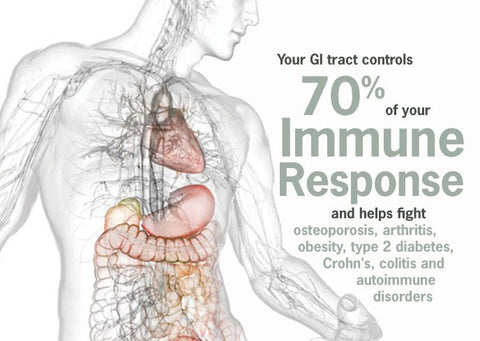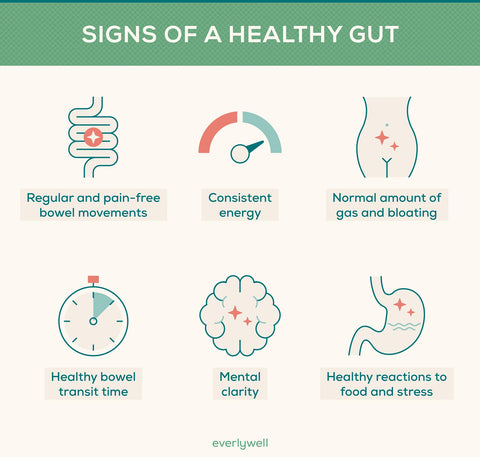CBD for Digestive Health: A Natural Approach to Gut Wellness

Digestive health plays a pivotal role in our overall well-being, acting as a cornerstone for a healthy and balanced life. This complex system, which encompasses everything from our mouth to our stomach, intestines, and beyond, is responsible for processing the nutrients we need while eliminating waste and toxins. A smoothly functioning digestive system is crucial not only for absorbing essential nutrients but also for maintaining our immune system, hormonal balance, and even our mental health.
However, for many individuals, digestive health can be a source of discomfort and frustration, with conditions like Irritable Bowel Syndrome (IBS) and Inflammatory Bowel Disease (IBD) casting a long shadow over their daily lives. These conditions bring with them a myriad of symptoms, including abdominal pain, irregular bowel movements, inflammation, and persistent discomfort.
Enter CBD, or cannabidiol, a natural compound derived from the cannabis plant. While often associated with its potential in alleviating pain or reducing anxiety, CBD has gained attention in recent years for its possible role in promoting digestive health. In this blog post, we will delve into the fascinating world of CBD and its potential to transform the lives of those grappling with digestive disorders, with a specific focus on IBS and IBD.
The purpose of this blog post is to shed light on the benefits of CBD for digestive health. We aim to provide insights into how CBD may help manage these challenging conditions, offering a potential natural alternative to traditional treatments. By exploring CBD's mechanisms of action, its ability to reduce inflammation, alleviate pain, and regulate gut motility, we hope to offer valuable information to those seeking relief from the burdensome symptoms of IBS and IBD.
As we journey through this exploration of CBD and digestive health, it's essential to keep in mind that every individual's experience is unique. Digestive disorders manifest differently in each person, and what works for one may not work for another. Therefore, before considering CBD as an option for managing digestive issues, it is crucial to consult with a healthcare professional who can provide personalized guidance and recommendations.
In the following sections, we will explore the science behind CBD's potential benefits, share real-life testimonials, discuss its advantages compared to traditional treatments, and address important considerations and precautions. Ultimately, our goal is to empower individuals with digestive disorders with knowledge about this intriguing natural remedy and its potential to bring relief and improve their quality of life.
CBD: An Overview
Cannabidiol, more commonly known as CBD, has surged to the forefront of health and wellness conversations, captivating the curiosity of many seeking natural remedies for a range of health conditions. As a constituent of the cannabis plant, CBD is part of a diverse family of compounds known as cannabinoids. Unlike its well-known counterpart, tetrahydrocannabinol (THC), CBD is non-psychoactive, meaning it does not induce the characteristic "high" associated with marijuana consumption.
Derived primarily from hemp, a variety of the cannabis plant, CBD has garnered attention for its potential therapeutic properties. The extraction and isolation of CBD from hemp have enabled the development of various products, including oils, capsules, edibles, topicals, and more. These products have quickly become popular choices for individuals seeking natural alternatives to traditional treatments.
One of the most significant aspects of CBD is its non-psychoactive nature. This means that individuals can potentially experience the therapeutic benefits associated with cannabis without the altered mental state often linked to THC. It opens the door to a wide range of possibilities for those who may have been hesitant due to the psychotropic effects of cannabis.
Moreover, CBD interacts with the body's endocannabinoid system (ECS), a complex network of receptors found throughout the body. The ECS is involved in regulating various physiological processes, including mood, pain perception, immune response, and more. CBD's interaction with the ECS is believed to play a vital role in its potential therapeutic effects.
CBD's potential as a natural remedy extends to various health conditions. Research and anecdotal evidence suggest that CBD may offer relief for ailments such as chronic pain, anxiety, depression, epilepsy, sleep disorders, inflammation, and more. Additionally, ongoing research continues to unveil new potential uses for CBD, expanding its applications and further supporting its status as a versatile and promising natural compound.
CBD and Digestive Health: How Does It Work?
To truly grasp the potential of CBD in promoting digestive health, it's essential to explore how this natural compound interacts with the intricate system known as the endocannabinoid system (ECS). This system, while relatively recently discovered, plays a pivotal role in regulating various physiological processes, including those related to digestion.
The ECS is composed of receptors, endocannabinoids (naturally occurring compounds produced by the body), and enzymes responsible for synthesizing and breaking down these endocannabinoids. Two primary receptors within the ECS are known as CB1 and CB2 receptors, and they are found throughout the body, including the gastrointestinal (GI) tract.
CBD, as an exogenous cannabinoid, interacts with the ECS by influencing these receptors. However, unlike THC, which primarily binds to CB1 receptors and can induce psychoactive effects, CBD has a more nuanced interaction. It acts as a modulator rather than a direct agonist, meaning it can enhance or inhibit the activity of CB1 and CB2 receptors.
CBD's influence on the ECS has the potential to impact digestive health in several ways:
- Regulating Gut Motility: CBD may help regulate the movement of the GI tract, which is crucial for proper digestion. In conditions like IBS, where irregular bowel movements are common, CBD's ability to promote regularity could provide relief.
- Reducing Inflammation: Inflammation is a key factor in many digestive disorders, including IBD. CBD's potent anti-inflammatory properties have been a subject of great interest. It may help reduce inflammation in the GI tract, alleviating symptoms and promoting healing.
- Alleviating Pain: Chronic abdominal pain is a common complaint among individuals with digestive issues. CBD's potential to alleviate pain may lead to improved comfort and a better quality of life for those dealing with these conditions.
- Modulating Immune Responses: The ECS also plays a role in immune function. By modulating immune responses, CBD could help manage autoimmune-related digestive disorders, such as Crohn's disease, by reducing the immune system's attack on healthy tissue.
- Supporting Overall Gut Health: Beyond its direct effects, CBD's ability to reduce stress and anxiety may indirectly benefit digestive health. High levels of stress can exacerbate digestive problems, and CBD's anxiolytic properties may help manage these psychological factors.
While the potential of CBD in promoting digestive health is promising, it's important to remember that individual responses may vary. The effectiveness of CBD can depend on factors such as the specific digestive condition, the severity of symptoms, and an individual's unique physiology. Before incorporating CBD into your digestive health regimen, it's crucial to consult with a healthcare professional who can provide personalized guidance and recommendations tailored to your needs.
Benefits of CBD for Digestive Health
Digestive health is a fundamental aspect of overall well-being, and for those grappling with conditions like Irritable Bowel Syndrome (IBS) and Inflammatory Bowel Disease (IBD), finding effective relief can be a daily challenge. In recent years, CBD, or cannabidiol, has emerged as a promising natural remedy for managing digestive issues. Here, we delve into three key benefits of CBD for digestive health:
- Reducing Inflammation:
Inflammation is a common denominator in many digestive disorders, including IBS and IBD. CBD's potent anti-inflammatory properties have been a subject of keen interest. By interacting with receptors in the body's endocannabinoid system, CBD may help reduce inflammation in the gastrointestinal (GI) tract. This can have a profound impact on managing symptoms such as abdominal pain, cramping, and bloating.
Several studies support the anti-inflammatory potential of CBD. For example, a study published in the European Journal of Pain found that topical CBD application reduced inflammation and pain in a rat model of arthritis. While more research specific to digestive health is needed, these findings suggest that CBD's anti-inflammatory effects could be beneficial for individuals with IBS and IBD.
- Pain Relief:
Chronic abdominal pain is a hallmark of many digestive disorders, often diminishing the quality of life for those affected. CBD offers a potential solution to this pervasive issue. By interacting with the ECS and modulating pain receptors, CBD may alleviate pain associated with digestive issues.
The potential pain relief provided by CBD is not only important for physical comfort but also for mental well-being. Constant pain can lead to stress, anxiety, and even depression, exacerbating digestive symptoms. CBD's ability to address pain can improve the overall quality of life for individuals with digestive disorders, providing both physical and emotional relief.
- Regulating Gut Motility:
Irregular bowel movements are a common source of distress for individuals with digestive disorders. CBD may offer hope in this regard by helping to regulate gut motility, or the movement of the GI tract. For those with IBS, this could mean relief from alternating bouts of diarrhea and constipation, while individuals with IBD may experience more regular and less disruptive bowel movements.
CBD's effect on gut motility is believed to be mediated through its influence on the endocannabinoid system. By balancing the activity of receptors in the GI tract, CBD may promote smoother and more predictable digestion.

CBD vs. Traditional Treatments: A Closer Look at Digestive Disorders
Digestive disorders like Irritable Bowel Syndrome (IBS) and Inflammatory Bowel Disease (IBD) often require long-term management, and individuals dealing with these conditions frequently explore various treatment options. Traditional treatments, including prescription medications and lifestyle modifications, have been the primary approach. However, the emergence of CBD (cannabidiol) as a potential remedy for digestive issues has sparked a new avenue of exploration. Let's compare CBD with traditional treatments and highlight some potential advantages of using CBD:
- Effectiveness:
Traditional Treatments: Traditional treatments for digestive disorders often involve a combination of medications such as anti-inflammatories, immunosuppressants, and anti-diarrheal drugs. While these can be effective, they may not work for everyone, and the response can vary.
CBD: CBD's effectiveness in managing digestive issues is still being researched, but early findings and anecdotal evidence suggest it may offer relief for some individuals. Its multifaceted approach, including anti-inflammatory and pain-relieving properties, makes it an attractive option.
- Side Effects:
Traditional Treatments: Many traditional medications used for digestive disorders come with a list of potential side effects, some of which can be severe. These may include nausea, headaches, and even increased risk of infections for immunosuppressants.
CBD: CBD is generally well-tolerated, with few reported side effects. It does not produce the psychoactive effects associated with THC, making it a safer option for many individuals. However, it's crucial to note that CBD may interact with other medications, so consultation with a healthcare professional is vital.
- Natural Approach:
Traditional Treatments: Traditional treatments often involve synthetic medications that target specific symptoms or processes in the body. While effective, some individuals prefer more natural approaches to their health.
CBD: CBD is derived from the cannabis plant and is considered a natural remedy. Many individuals are drawn to CBD's holistic approach, especially when they are seeking alternatives to pharmaceuticals.
- Personalized Treatment:
Traditional Treatments: Traditional treatments are often prescribed in a one-size-fits-all manner, with little room for customization based on an individual's unique needs and preferences.
CBD: CBD allows for a more personalized approach. Dosage can be adjusted, and different forms of CBD (e.g., oils, capsules, topicals) can be tailored to suit an individual's preferences and specific digestive issues.
Traditional treatments have their place in managing digestive disorders, CBD offers a potential alternative with several advantages. Its effectiveness, reduced side effects, natural origin, and personalized approach make it an appealing option for individuals seeking relief from digestive challenges. CBD should be considered as part of a comprehensive approach to digestive health, and its use should be carefully monitored and adjusted as needed.
Considerations and Precautions: Using CBD for Digestive Issues
When considering CBD as a potential remedy for digestive issues like Irritable Bowel Syndrome (IBS) or Inflammatory Bowel Disease (IBD), it's crucial to approach its use with careful consideration and precautions. Here are some essential factors to keep in mind:
- Consulting a Healthcare Professional:
Importance of Professional Guidance: Before incorporating CBD into your digestive health regimen, consult with a healthcare professional, particularly one knowledgeable about CBD and its potential interactions with digestive disorders. They can provide personalized advice based on your specific condition, medications, and medical history.
Identifying Underlying Issues: Digestive issues can be symptomatic of underlying health conditions. A healthcare professional can help diagnose and determine the root cause of your symptoms, ensuring that CBD is an appropriate treatment.
- Starting with a Low Dose:
Gradual Introduction: When beginning CBD for digestive issues, it's advisable to start with a low dose and gradually increase it as needed. This cautious approach allows you to assess your body's response and adjust the dosage accordingly.
Monitoring Effects: Pay close attention to how your body reacts to CBD. Keep track of changes in symptoms, any side effects, or improvements in your digestive health. This information can be invaluable for adjusting your CBD regimen.
- Potential Medication Interactions:
Consult with Medication Prescribers: If you are taking medications for your digestive disorder or other health conditions, discuss CBD use with the healthcare professionals who prescribed those medications. CBD has the potential to interact with certain drugs, affecting their efficacy or causing unexpected side effects.
CYP450 Enzyme Interaction: CBD is known to inhibit the cytochrome P450 (CYP450) enzyme system, which is involved in the metabolism of many medications. This can lead to altered blood levels of medications, potentially requiring dosage adjustments.
- Individual Variations in Response:
Bioavailability: Keep in mind that individual responses to CBD can vary significantly. Factors such as metabolism, body weight, and the form of CBD used (e.g., oil, capsule, topical) can influence how your body processes and responds to the compound.
Patience is Key: CBD may not provide immediate relief for digestive symptoms, and it may take time to see noticeable improvements. Be patient and persistent in your approach, and continue to work closely with your healthcare provider to refine your treatment plan.
CBD holds promise as a potential remedy for digestive issues, it's vital to exercise caution, seek professional guidance, and proceed thoughtfully. Consulting with a healthcare professional, starting with a low dose, being aware of potential medication interactions, and recognizing individual variations in response are essential steps to ensure the safe and effective use of CBD for digestive health. By approaching CBD use responsibly, you can harness its potential benefits while minimizing potential risks and maximizing its positive impact on your digestive well-being.
Legal and Ethical Aspects: Navigating CBD for Digestive Health
The legal and ethical landscape surrounding CBD (cannabidiol) is a critical consideration when exploring its use for digestive health. Here, we'll delve into the legal status of CBD and the significance of sourcing high-quality, reputable CBD products:
Legal Status of CBD:
CBD's legal status varies considerably from one region to another, which can create confusion for consumers. In some regions, CBD is fully legal, while in others, it falls into a legal gray area or is strictly regulated.
Fully Legal: In some parts of the world, CBD derived from hemp with minimal to no THC content (the psychoactive compound in cannabis) is legally recognized and readily accessible. It can be used for various purposes, including for digestive health.
Legal Gray Area: In certain regions, the legality of CBD may be ambiguous or subject to interpretation. Regulations may not explicitly address CBD, making it challenging for consumers to discern whether its use is permitted.
Strictly Regulated: In other areas, CBD may be heavily regulated or even prohibited. It's essential to research and understand the specific laws and regulations governing CBD in your region before considering it as a treatment for digestive issues.
Sourcing High-Quality CBD Products:
Regardless of the legal status, sourcing high-quality CBD products is paramount for ensuring safety, efficacy, and ethical considerations:
Reputable Manufacturers: Choose CBD products from reputable manufacturers who follow good manufacturing practices (GMP) and have transparent labeling. Look for brands that provide third-party lab testing results, which verify the product's cannabinoid content and purity.
Hemp Source: Understand the source of the hemp used to extract CBD. High-quality CBD is typically derived from organically grown hemp that is free of pesticides, herbicides, and other contaminants.
Extraction Methods: Learn about the extraction methods used by the manufacturer. Supercritical CO2 extraction is considered one of the cleanest and most efficient methods, as it doesn't leave residual solvents in the final product.
Full-Spectrum vs. Isolate: Decide whether you prefer full-spectrum CBD (which contains a range of cannabinoids, including trace amounts of THC) or CBD isolate (pure CBD). The choice may depend on your region's legal restrictions and personal preferences.
Consult Healthcare Professionals: Seek guidance from healthcare professionals, particularly those with expertise in CBD and digestive health, when selecting products. They can help you make informed decisions based on your specific condition and needs.
Avoid Unsubstantiated Claims: Be wary of products making extravagant claims about curing or treating diseases. While CBD holds promise for many health conditions, it is not a miracle cure, and claims should be backed by scientific evidence.
Navigating the legal and ethical aspects of CBD for digestive health requires diligence and informed decision-making. By staying informed about the legal status of CBD in your region, sourcing high-quality products, and consulting healthcare professionals, you can make responsible choices that prioritize your well-being while ensuring adherence to legal and ethical standards.

Conclusion: Harnessing CBD's Potential for Digestive Health
In conclusion, CBD (cannabidiol) holds significant promise as a potential remedy for managing digestive issues such as Irritable Bowel Syndrome (IBS) and Inflammatory Bowel Disease (IBD). Throughout this exploration, we've uncovered several potential benefits that make CBD an attractive option for those seeking relief from the burdensome symptoms of digestive disorders.
Potential Benefits of CBD for Digestive Health:
Reducing Inflammation: CBD's potent anti-inflammatory properties may help manage inflammation in the gastrointestinal tract, a common factor in digestive disorders, providing relief from symptoms like abdominal pain and bloating.
Pain Relief: CBD's potential to alleviate chronic abdominal pain associated with digestive issues can significantly improve an individual's quality of life, both physically and mentally.
Regulating Gut Motility: CBD's ability to regulate gut motility can aid digestion and potentially address irregular bowel movements, a prevalent concern for those with digestive disorders.
Encouragement to Explore CBD Responsibly:
We encourage readers to consider CBD as a potential option for managing digestive health under professional guidance. As with any health-related decision, it's crucial to consult with a healthcare professional, preferably one with expertise in CBD and digestive health. They can provide personalized advice based on your unique condition, medical history, and any potential interactions with existing treatments or medications.
Individualized Approaches and Consulting Healthcare Professionals:
Every individual is unique, and what works for one person may not work the same way for another. Hence, embracing an individualized approach is essential when exploring CBD for digestive health. The efficacy of CBD can vary based on factors such as metabolism, body weight, dosage, and the specific digestive condition being addressed.
It cannot be emphasized enough that consulting healthcare professionals is of paramount importance. They can guide you in choosing the right CBD product, determining appropriate dosages, and monitoring your progress. Their expertise ensures that CBD is incorporated into your digestive health regimen safely and effectively, maximizing its potential benefits.
In conclusion, as we continue to learn more about CBD and its potential therapeutic applications, it's an exciting time for those seeking alternative options for managing digestive issues. By approaching CBD use responsibly, seeking professional guidance, and remaining vigilant in our pursuit of well-being, we can navigate this emerging field of natural remedies and strive for improved digestive health and an enhanced overall quality of life.

So what makes Mission Lago Farms' CBD products so special?
For starters, we use only the highest quality, organic hemp plants grown at our farms. These plants are carefully cultivated to protect the terpenes and flavonoids and to produce the most potent and effective CBD products possible. Our products are free from pesticides, herbicides, and other harmful chemicals, ensuring that you get only the purest, most potent CBD possible. And our attention to detail doesn't stop there. We carefully craft each product to ensure that it's effective, easy to use, and, most importantly, safe.
It's not just the quality of the plants that sets Mission Lago Farms apart. We also use a proprietary extraction process that ensures that all of the beneficial compounds found in the hemp plant are preserved.
This means that our CBD tincturel is not only potent, but it's also full-spectrum, meaning it contains a wide range of cannabinoids, terpenes, and other beneficial compounds.
Mission Lago Farms offers a wide range of CBD products to choose from, including tinctures, teas, and pre rolled flower. Each product is carefully crafted to deliver the maximum amount of benefit possible.
Our CBD tinctures, for example, are available in a range of strengths from 1500 mg to 3000 mg to suit any need. With flavors like peppermint, mountain berry and orange, they're not only effective, but they're also delicious.
For those who prefer teas, Mission Lago Farms offers a range of options, including our popular Hemp Chamomile Tea, Black Tea, Lemon Grass Tea and Chai Tea which are all perfect for those who prefer a more discreet method of taking CBD.
At Mission Lago Farms, we use only the highest-quality, organic hemp plants to extract our CBD. Our products are free from pesticides, herbicides, and other harmful chemicals, ensuring that you get only the purest, most potent CBD possible. And our attention to detail doesn't stop there. We carefully craft each product to ensure that it's effective, easy to use, and, most importantly, safe.
One of Mission Lago Farms' most popular products is our CBD tincture. It's a simple, yet effective way to get your daily dose of CBD. By simply placing a few drops under the tongue, the CBD is absorbed directly into the bloodstream, providing fast and effective relief for whatever aches, pains or overwhelm that life throws at you.
We believe everyone has the ability to have a happy healthy gut. So go ahead and enjoy a few delectable drops of one of our flavorful, healing tinctures, teas, honey and more. You deserve it! We help you feel good in your body today;)







